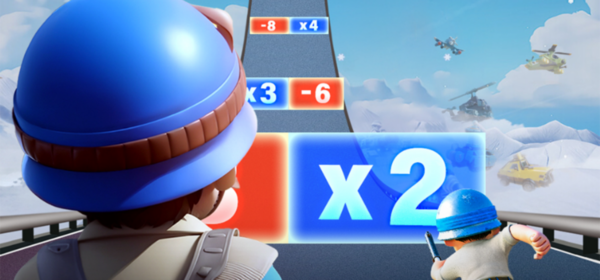2020 results: Lana Meisak and Andrey Mikhlin from Gismart on the main things for the year
Gismart's top executives spoke in detail about trends in the mobile games market: Lana Meisak, Vice president of business Development, marketing and publishing, as well as Andrey Mikhlin, head of game development.
Lana Meisak and Andrey Mikhlin
How was 2020 for the company?
LANA: 2020 has become very busy for Gismart. During the year, we launched about 15 hyper-casual and idler games into global release, and also launched several casual games that will be released in softlonch in 2021. Among our releases, I would mention the hyper-casual hits Foil Turning 3D and VIP Guard (entered the top 10 games in 77 countries), and two idlers — Mom and Baby Idle 3D and Little Ant Colony.
In addition to games, we have released 12 new entertainment apps. At the moment, our portfolio consists of 40 products, which account for more than 600 million downloads.
We have expanded our partnership on instant games. In particular, after our Color Galaxy game became one of the flagship products on the Snap Games platform, we agreed to release a number of new games exclusively for Snapchat. Now the games are in development, one of them will be released very soon.
At the beginning of the year, we opened the 4th office, this time in Kiev. The decision to open an office in a new location was due to the need to expand the team for new projects. Today, more than 60 people work there, 30 of whom are new employees, the rest are from Minsk: they moved to Kiev as part of our internal relocation program.
Among other achievements of this year, I would like to mention the inclusion of Gismart in the ranking of the fastest growing companies in Europe according to the Financial Times (FT1000). We took the 6th place among thousands of other companies.
What new trends in your niche do you consider worth paying attention to?
Lana: I would note two points here: the issues of plagiarism and intellectual property, as well as the increased interest of investors in the mobile games market.
Plagiarism
The trend that manifested itself back in 2019, and in 2020 turned out to be at its peak, is the copying of game mechanics. The recent lawsuit between Voodoo and Rollic has set a high-profile precedent in the industry. When creating game scenarios, developers are usually inspired by real life, so when games are built on simple mechanics, they can really be similar to other games. All developers today have become hostages of this situation to some extent. However, in today's realities, it is important to understand that game mechanics alone is not a guarantee of success. The most successful publisher will be the one that scales the game faster and attracts the largest number of users thanks to an effective marketing strategy. The search for a low CPI has become much more complicated over the past year, so a high LTV is more important than ever to get a good ROI and profit.
Investments, mergers, acquisitions
The second trend that attracts attention is the boom in acquisitions and mergers among gaming companies. Smaller studios have to team up with larger players in order to compete. In addition, there is a noticeable increase in interest from investors. And this is not surprising: today, mobile games are the most popular video game format in the world, overtaking PCs and consoles. The Newzoo analytical platform has adjusted its forecasts for 2020, raising the expected revenue of the mobile gaming market from $77.2 billion to $86.3 billion dollars. And this figure will continue to grow next year.
What new market trends would you note in general?
Andrey: I will highlight three trends.
Stricter requirements for projects
On the one hand, competition among publishers is growing. They are constantly developing and improving systems of interaction with developers. Corporations such as Voodoo use special platforms for testing games, which creates a certain funnel of products and allows you to identify the game with the greatest potential.
On the other hand, publishers raise the bar when deciding to collaborate with a particular studio. The partner must have successful experience in launching projects, a well-coordinated team, an understanding of product metrics and how to reach the desired product indicators. And the stronger the developer is from this position, the more chances he has to launch his game with an experienced publisher.
Product improvement
Given the highest level of competition, the process of product improvement is inevitable. In the struggle for the user and, consequently, profit, hybrid genres are gradually beginning to appear, meta is becoming more complicated, which makes monetization more effective. In 2021, I think we will see a lot of interesting releases in hybrid genres.
Portfolio Expansion
Major publishers are starting to expand their portfolio and go beyond one genre. Some publishers, having made a name for themselves on casual projects, go towards the development of hyper-casual games, and vice versa. This is done in order to diversify the business and focus on increasing the volume of profits.
What will be the stake in the development of the company in 2021?
Lana: Our main focus for 2021 is the release of new games and the expansion of Gismart's share in the entertainment application market. We will continue to develop and publish hyper-casual games and idler games, involving internal teams and partner studios.
In the new year, two of our big casual games will be released in softlonch. Games belong to a relatively unloaded but actively growing niche. We think that we will be able to interest the audience and compete with other projects on the market.
In addition to games, we will continue to work on growing the audience of our flagship music entertainment applications (Beat Maker Go, Piano, Guitar, Karaoke) and develop younger promising products (for example, DJ It!). In addition, we will continue to collaborate with musical artists on both current and new projects.
If we talk about promising markets (in terms of geography), we will continue our expansion in Asia, specifically in China. Despite our success in this market, we see opportunities for further growth on Android. We will focus on working with local publishers, including relatively new ones, but already having a huge audience. For example, with Ohhoo, which is owned by Bytedance, which owns TikTok.
Which third-party game releases are you interested in this year? Which ones did you pay attention to as a gamer?
Andrey: In the last two years, I have been so focused on the development of the Gismart gaming direction that I have not been able to play much outside the framework of hyper-casual and casual games. Therefore, many worthwhile game releases of other genres reached me late. For example, God of War. From the point of view of game design, this game is divine. All levels are well thought out and involve the player in a great way. In addition, the highest quality of content, the script is competently deployed from the point of view of psychology, the main characters are father and son. When, for example, in the game you need to perform a routine action, swim from point A to point B, the father begins to tell the story to his son, which adds meaning and draws the player even more. It would seem that this is just a game, but it raises such important issues as the relationship between fathers and children.
The disappointment of the year is Ubisoft's new Assassin's Creed. My expectations (and perhaps not only mine) from the game were not justified. The fight scenes are not made as well as we would like — it is played poorly. The story unfolding in the game is too obvious and does not involve. Compared to the previous part, it has become much more boring, there is no development.
Among the hyper-casual games, I would like to mention Wacky Run from Voodoo for its creative approach.

